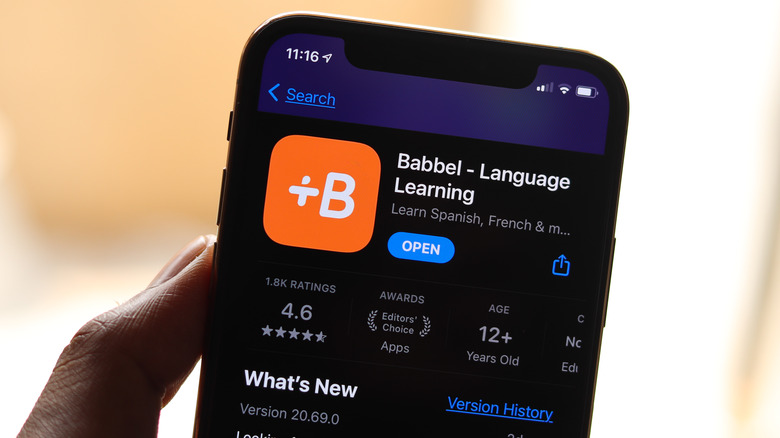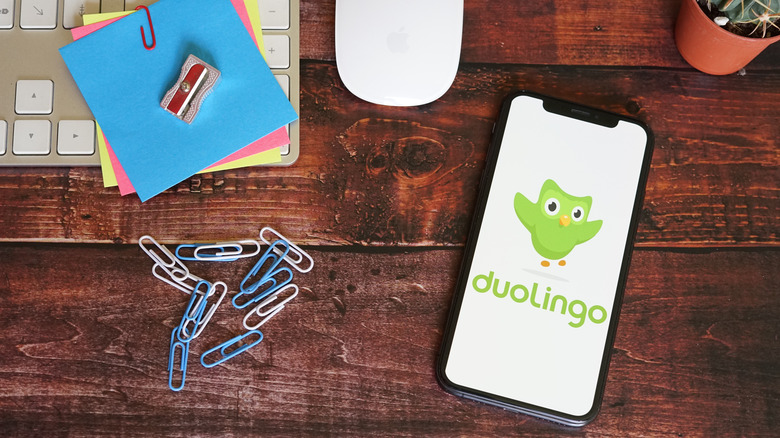5 Fabulous Apps To Help Teach You A New Language
Did you know that learning a new language could improve your memory? As it turns out, bilingual individuals tend to perform better on memory tests compared to their monolingual peers, according to 2012 research published in the Journal of Cognitive Psychology (via National Library of Medicine). What's more, speaking other languages may improve executive function and mental focus, notes Whitby School.
But that's not all. By learning a new language, you'll gain insight into other cultures and see things from a different perspective. This aspect alone could help your career and open up new opportunities. A few years from now on, you could participate in workshops, seminars, and other activities in that specific language. Plus, you might get the chance to work or study abroad and gain a competitive edge in the job market.
According to the Center for Immigration Studies, nearly half of the people living in America's five largest cities speak a second language. You, too, can learn to speak Spanish, French, German, or even Japanese. Digital technology makes the whole thing a lot easier, and there are dozens of apps you can use to broaden your knowledge. Ready to give it a try? For starters, check out these language learning apps and pick one that meets your needs.
Babbel offers 10-minute language lessons
Babbel features 10-minute language lessons for students of all levels. Members also have access to podcasts, games, and live tutoring classes designed to facilitate learning. After registration, you can sign up for courses in Danish, Swedish, French, Spanish, Dutch, and eight other languages from around the world. The platform offers over 60,000 lessons — plus downloadable certificates for each course you complete.
As far as pricing goes, members can subscribe to Babbel for one, three, six, or 12 months. The monthly plan starts at around $10, but you can save up to 50% with a yearly subscription (via Babbel). Each course includes a free lesson to give you a taste of what it's like to learn with Babbel.
Reviews on Trustpilot are mostly positive. Users say that Babbel allows them to study at their own pace and offers the tools they need to improve their vocabulary, learn pronunciation, and hone their grammar skills. Last year, Forbes rated it as the best overall language-learning app on the market.
Get free language lessons with Duolingo
Duolingo is one of the few language learning apps that doesn't charge a subscription fee. What's more, it offers online courses in 40 different languages, such as Chinese, Italian, Hindi, Navajo, German, and Greek (via Duolingo). The lessons are short and engaging, with a clear structure for easier learning. Members can also listen to podcasts, set daily goals, complete practical exercises, and test their newly acquired skills.
Eric Ravenscraft, a contributor to The New York Times, used the Duolingo app for 500 days. His conclusion was that it's possible to learn the basics with Duolingo or other apps, but it may not be enough to become fluent in that language. Ravenscraft suggests using the app as a starting point. As you progress, consider taking in-person classes to develop and practice your language skills.
Similarly, Cambridge Coaching says that Duolingo can be a great learning tool due to its interactive features. It not only allows you to study on the go, but it also keeps you motivated and engaged. Plus, it provides real-world examples of how to use the words and phrases learned. But even so, it's not the best way to learn grammar and pronunciation. The experts at Cambridge Coaching recommend using Duolingo along with other learning platforms that use a slightly different approach. Alternatively, reach out to a native speaker or hire a private tutor for more in-depth learning.
Practice with a native speaker on Hello Talk
When learning a new language, you might not know how to use and pronounce certain words. Duolingo and other similar apps use speech recognition software, but it's not the same as talking with an actual person. If you already know the basics, consider using an app like Hello Talk so you can practice with native speakers.
Hello Talk is a social platform for those interested in learning a foreign language. Its interface might remind you of Instagram or Facebook Messenger. Simply download the app on your smartphone or tablet and then search for language exchange partners by gender, location, native language, and other criteria. Once you've found the perfect match, send them a message and start chatting.
As of today, the app has more than 30 million users and supports 150 languages. Members can call each other, communicate in writing, leave voice messages, and share updates with other users. The platform also features translation tools and other helpful resources. Another cool feature is that you get to choose who can reach out to you, notes PCMag. So, if you don't feel comfortable chatting with users of a certain age, you can simply change your privacy settings. The app also allows you to block other members with the click of a button.
Learn rare languages with Transparent Language Online
Are you interested in rare or obscure languages like Denaakk'e, Latin, Maori, or Hmong? Before heading to the library, check out Transparent Language Online, an educational platform for individuals, companies, governments, and schools. Members can choose from over 100 languages, including some with just a handful of speakers worldwide (via Transparent Language Online). For example, you could learn to speak Denaakk'e, a relatively obscure language known by only 150 people, according to Alaska Native Languages. This skill may come in handy if you ever decide to visit Alaska and want to truly connect with the locals.
The app also offers courses in popular languages such as French, Dutch, Italian, Spanish, and Portuguese. Although it's not as interactive as Babbel or Duolingo, it has a more structured approach to language learning. There's also the option to set daily goals and track your progress, customize your lessons, or work with a tutor.
New users can try the platform for 14 days at no extra charge before committing to a membership plan. Pricing starts at $24.95 per month for one language or $49.95 per month for access to all courses available on the platform.
Lirica uses music to help you learn a language
Perhaps not surprisingly, music facilitates language learning and can make it easier to recall new words, suggests a 2002 study published on the platform Core. Research also indicates that music may improve cultural awareness and help students with grammar, pronunciation, and other aspects of language acquisition, according to Murray State University. Over time, it may improve your language skills and allow you to grasp new concepts more easily.
As you might have guessed, there's an app for that. Lirica harnesses the power of music to help students learn French, Spanish, or German on the go. Users can listen to popular songs by Usher, Shakira, and other top artists while reading the lyrics. The app also offers grammar tips, vocabulary lessons, translation games, and other learning tools. A monthly subscription is $8.49 on the App Store and Google Play, but you can sign up for a quarterly, biannual, or yearly plan to bring the cost down.
Lirica can be a powerful learning tool, but it's not enough on its own. Ideally, use it along with Babbel, Duolingo, or other language learning apps, such as Rosetta Stone or Memrise. Another option is to hire a tutor via Preply or a similar platform and use language learning apps to speed things up. This approach would allow you to study on the go, refresh your language skills, and enjoy a more interactive experience.





